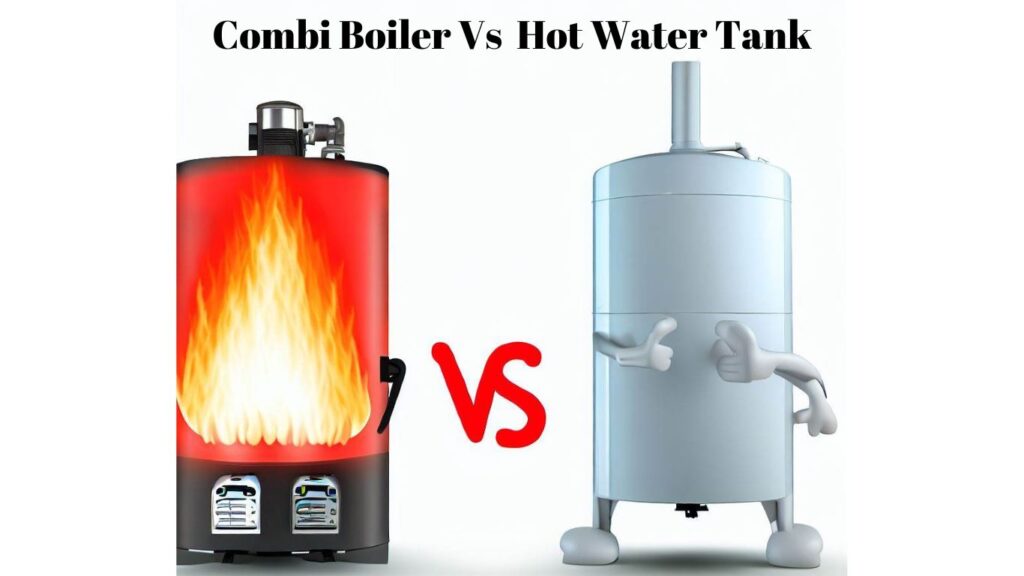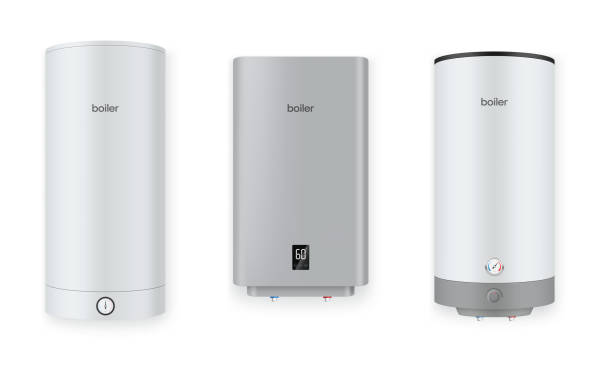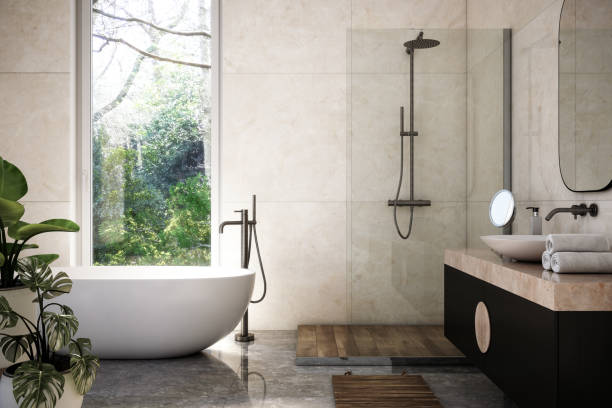
Introduction
Deciding between a combi boiler or hot water tank for your home can be a confusing process. Both heating systems have their unique advantages, but which one is the best fit for your needs? In this blog post, we will explore the differences between combi boilers and hot water tanks, discuss their pros and cons, and provide guidance on how to choose the right option for your household requirements.
Key Takeaways
- Combi boilers are a space-saving and energy-efficient heating solution that provides both central heating and hot water on demand without requiring external storage tanks.
- Hot water tanks store large amounts of heated water for long periods, making them ideal for larger households with high hot-water usage needs but take up more space.
- Individual household requirements, installation costs and time, energy efficiency concerns should all be carefully considered when choosing between the two options.
- Consultation with a professional plumber or heating engineer can also help guide you towards making the best decision for your home.
Understanding Combi Boilers And Hot Water Tanks
Combi boilers are compact heating systems that provide both hot water and central heating, without the need for an external cold-water tank or hot water cylinder, while hot water tanks store and heat large amounts of water for use in the home.
Definition And Explanation Of Combi Boilers
A combi boiler, short for combination boiler, is an innovative heating solution designed to meet both your home’s central heating and hot water needs efficiently.
One of the primary advantages of this compact system is that it does not require separate storage units like a conventional boiler does – meaning there’s no need for an external cold-water tank or hot water cylinder.
The efficient nature of combi boilers can be attributed to their ability to provide heating and hot water simultaneously while saving space in your home. By eliminating the need for additional tanks and cylinders, you free up valuable room – making them a popular choice among homeowners with limited space or those aiming for a minimalist design approach.
In addition to saving space, another key benefit of opting for a combi boiler lies in its energy efficiency levels.
Combi boilers work through two distinct processes; heating your home via radiators and providing instantaneous hot water upon demand from taps or showers.
As soon as you turn on a tap or start the shower, cold mains water flows into the unit where it passes over a powerful heat exchanger that rapidly heats the incoming cold supply before sending it back out at desired temperature levels throughout your property.
Definition And Explanation Of Hot Water Tanks

A hot water tank, also known as a water cylinder or storage heater, is a system that stores hot water for use throughout the day. It works by heating up the water and storing it in an insulated tank until it’s needed.
Hot Water Tanks are usually installed alongside a conventional boiler or immersion heater – both of these systems can heat large quantities of water at once when used in conjunction with a hot-water tank.
However, compared to combi boilers, they tend to take up more space as they require installation of both cylinder and an external cold-water tank – limiting users who dwell in flats or apartments.
Differences In Functionality
Combi boilers and hot water tanks serve the same purpose, but their functionality differs. Combi boilers are designed to provide both heating and hot water. They take cold water directly from the mains supply and heat it as needed using a high-efficiency heat exchanger, rather than storing hot water in a cylinder.
In contrast, hot water tanks store the heated water in a tank until it is needed. The stored hot water can be used for central heating or domestic use such as showering or washing dishes.
However, this means that they require more space compared to combi boilers since you need room to install both the tank and boiler separately.
Pros And Cons Of Combi Boilers
Pros of combi boilers include their high efficiency, compact size, and lack of need for a separate hot water tank.
Advantages Of Combi Boilers
Combi boilers have gained popularity in recent years, and for good reason. Here are some of the advantages of choosing a combi boiler for your home heating and hot water needs:
- Space-saving: Combi boilers do not require a separate hot water cylinder or cold-water tank, making them ideal for homes with limited space.
- Energy-efficient: Combi boilers are highly efficient in terms of energy consumption, providing on-demand heat and hot water only when needed. This means lower energy bills and reduced carbon footprint.
- Quick heating: With a combi boiler, you can enjoy instant hot water without waiting for the tank to heat up.
- Reduced risk of leaks: As there are no external tanks involved, there is less chance of leaks or burst pipes causing damage.
- Lower installation costs: Since there is no need for separate hot water cylinders and cold-water storage tanks, installation costs may be cheaper compared to conventional boilers.
- Less complex maintenance: Combining a heating system and hot water supply into one unit means that there are fewer components to maintain and repair over time.
- Better water pressure: A combi boiler can provide better mains pressure because it does not rely on gravity to deliver the hot water supply like traditional systems do.
In short, Combi boilers offer several key advantages over traditional systems, including space-saving, energy efficiency, quick heating times, lower installation costs, reduced risk of leaks, less complex maintenance requirements, and improved water pressure.
Disadvantages Of Combi Boilers
Combi boilers are popular options for homeowners and tenants alike due to their compact design and efficient operation. However, there are some disadvantages to consider before making a final decision on whether a combi boiler is the right choice for your home heating and hot water needs. Here are some of the drawbacks of using a combi boiler:
- Limited hot water supply – As the combi boiler doesn’t come with a separate hot water tank, it can only supply limited hot water to your home at any given time. This means if you have multiple people needing hot water simultaneously, such as during peak morning hours, you may experience a drop in water pressure or even cold showers.
- Inconsistent flow rate – Due to the nature of combi boilers, their flow rate can be inconsistent depending on factors like external temperature and incoming water pressure. This could lead to fluctuations in shower temperatures or slower fill times for baths.
- Unsuitable for larger homes – If you live in a larger property with multiple bathrooms or high hot water demand, then a combi boiler may not be suitable as it may struggle to supply sufficient heat and warm water when needed.
- Expensive installation costs – While lower running costs make them an attractive option long-term, combi boilers tend to have higher upfront installation costs compared to other types of boilers.
- Complex maintenance requirements – Combi boilers tend to have more complex maintenance requirements than conventional boilers, which may result in higher maintenance costs over time.
It’s essential to weigh these advantages and disadvantages before deciding whether a combi boiler is the right option for your household requirements and heating needs.
Pros And Cons Of Hot Water Tanks
Hot water tanks provide a constant flow of hot water, making them ideal for larger households and homes with multiple bathrooms. However, they take up more space than combi boilers and can be less energy-efficient.
Advantages Of Hot Water Tanks
Hot water tanks have been popular for many years, and there are several advantages to using them in your home. Here are some of the benefits:
- Reliable hot water supply: With a hot water tank, you can be assured of a constant supply of hot water, making it very convenient to meet your household’s needs.
- More suitable for larger households: Hot water tanks can provide hot water to several taps at once; therefore, they are more suitable for larger households where more than one person needs access to hot water simultaneously.
- No loss of pressure: Unlike combi boilers, hot water tanks do not lose pressure when two or more taps are used at once.
- Energy-efficient options available: Modern electric and gas hot water tanks come with energy-efficient features that help you save money on your energy bills while still enjoying the comfort of reliable hot water supply.
- Easy maintenance: Hot water tanks require little maintenance compared to combi boilers since they have fewer components that need servicing regularly.
- Affordable installation costs: Hot water tank installation is relatively simple and typically less expensive than installing a new heating system such as a combi boiler.
- Can heat larger homes: If you have a large house with several bathrooms, a hot water tank may be the better option since it can heat multiple bathrooms from one central location without experiencing any fluctuation in temperature or pressure.
- Can accommodate renewable energy sources: Hot water tanks can support solar thermal panels or heat pumps that use renewable energy sources like wind or sun power, thereby reducing your carbon footprint and saving your money on utility bills.
In conclusion, choosing between a combi boiler and a hot water tank depends largely on individual household requirements, space considerations, installation time and cost, and energy efficiency concerns. Homeowners should carefully consider their heating and hot-water demands before deciding which option is best suited for their home.

Disadvantages Of Hot Water Tanks
Hot water tanks have been in use for many years to supply homes with hot water. Though they are still widely used, hot water tanks also have their drawbacks. Here are some of the disadvantages of hot water tanks:
- Limited Hot Water Supply: Hot water tanks come with a limited capacity, which means that you may run out of hot water if demand exceeds supply.
- Energy Inefficient: Hot water tanks consume a lot of energy because they need to maintain a constant temperature even when not in use.
- Space Requirement: Hot water tanks require a lot of space, typically in an airing cupboard or loft, making them unsuitable for smaller properties.
- Costly Installation: Installing a hot water tank can be expensive, as it requires extra plumbing work and additional equipment such as a cold-water tank.
- Heat Loss: Even with proper insulation, hot water tanks can lose heat over time, which leads to wastage.
- Maintenance Costs: Regular maintenance is required for hot water tanks to ensure they remain efficient and safe to use.
Overall, while hot water tanks can provide reliable hot water supply to homes, they are not always the best option due to their limitations and associated costs. If you are looking for an alternative solution that saves on energy consumption and helps reduce your carbon footprint, consider upgrading to a combi boiler system instead.
Choosing Between A Combi Boiler And A Hot Water Tank
Consider your household’s hot water requirements and available space before deciding between a compact combi boiler or a traditional hot water tank.
Household Requirements
Choosing between a combi boiler and a hot water tank depends on various household requirements. If you have limited space, then a combi boiler would be an ideal option as it is compact and does not require separate tanks, making installation easier.
Another aspect to consider is energy efficiency. Combi boilers are highly efficient and can save energy compared to traditional systems, making them the green choice for eco-conscious homeowners.
Ultimately, choosing the right heating system for your home depends on several factors such as household size and lifestyle choices.
Space Considerations
When it comes to choosing between a combi boiler and a hot water tank, one aspect to consider is the space available in your home. A combi boiler takes up less space as it combines both heating and hot water functions into one unit.
This means that you won’t need additional tanks or cylinders in your loft, airing cupboard, or elsewhere around your house.
On the other hand, if you have ample room for plumbing equipment and don’t mind using some of this extra space for storing hot water cylinders then a traditional hot water tank could work well for you.
It’s important to keep in mind that conventional boilers generally require more installation time and professional expertise due to their larger size and complexity of installation.
Installation Time And Cost
The installation time and cost of a combi boiler compared to a hot water tank is something that many homeowners consider when making their choice. Combi boilers are generally quicker and cheaper to install than hot water tanks because they do not require an external cold-water tank or hot water cylinder.
This means that installation can often be completed in just one day, while the cost can vary depending on whether you need to replace your existing heating system or if you’re installing one for the first time.
Additionally, since combi boilers heat water as needed, there’s no need for additional pipework, wiring, or radiators – which reduces both the complexity of installation and overall costs.
Energy Efficiency
One important factor to consider when deciding between a combi boiler or hot water tank is energy efficiency. Combi boilers are generally considered more efficient as they heat the water on demand, allowing for significant savings on heating bills.
With no need for a separate hot water cylinder, there is also less heat loss through storage, making it an eco-friendlier option too. Additionally, most modern combi boilers operate in condensing mode which means they recover some of the wasted heat from the exhaust gases that would otherwise be lost through the flue.
This makes them even more energy-efficient and could lead to further cost savings over time. On average, combi boilers can achieve efficiency rates of up to 90%, compared to conventional boilers that only attain around 70-80%.
Conclusion: Making The Right Choice For Your Home
In conclusion, when it comes to choosing between a combi boiler and hot water tank for your home, there are several factors to consider. If you have limited space and require an efficient system that can provide both heating and hot water on demand, then a combi boiler may be the right choice for you.
However, if you have a larger household with multiple bathrooms or high hot water usage requirements, then a traditional hot water tank system may be more appropriate.
Ultimately, the decision will come down to your household’s specific needs and preferences.
FAQs:
What is the difference between a combi boiler and a hot water tank?
A combi boiler heats water on demand and does not require a separate storage tank, while a hot water tank stores heated water for later use.
Which system is more energy-efficient: a combi boiler or hot water tank?
Combi boilers tend to be more energy-efficient as they only heat up the required amount of water when it is needed, whereas with a hot water tank, there may be heat loss from storing heated but unused water.
Can I install either system in my home?
Yes, both systems can be installed in most homes, but installation requirements including space available and plumbing set-up will depend on individual circumstances.
Which one should I choose for my home: a combi boiler or hot water tank?
The best choice for your home will depend primarily on your household’s usage needs and budget considerations. Combi boilers are often recommended for smaller households with lower demands regarding heating power consumption while larger homes or families typically opt against them due to their limited capacity to handle multiple outlets at once such as running showers simultaneously without affecting flow rates negatively compared to tanks which can store large amounts of heated supply ready-to-use anytime throughout day/night (even during peak hours).

